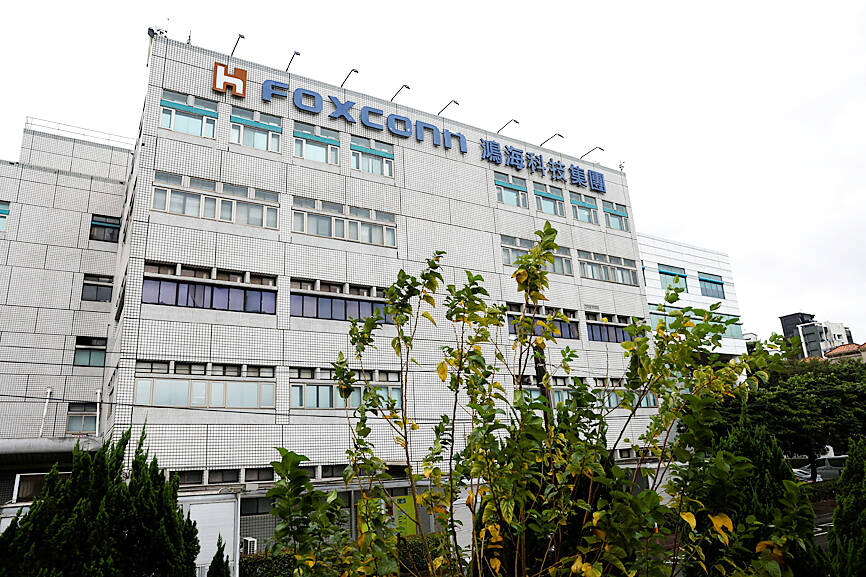Hon Hai Precision Industry Co (鴻海精密) yesterday issued a prewarning to investors that it might face a delay in receiving proceeds from the disposal of a 9.8 percent stake in China’s Tsinghua Unigroup Co (清華紫光).
The iPhone assembler made the statement in a filing with the Taiwan Stock Exchange following a report by the Chinese-language Liberty Times (sister paper of the Taipei Times) expressing investor concern that the payment might be late or not forthcoming, citing information published by Hon Hai’s China-listed Foxconn Industrial Internet Co (FII, 富士康工業互聯網).
FII, which trades on the Shanghai Stock Exchange, on Friday announced its plan to sell its Tsinghua shares to Yantai Haixiu IC Investment Center (煙臺海秀積體電路產業投資中心) for no less than 5.38 billion yuan (US$835.7 million).

Photo: Carlos Garcia Rawlins, Reuters
Hon Hai disclosed FII’s plan in a filing with the Taiwan Stock Exchange on the same day.
FII holds the Unigroup stake through 99.9 percent-held Xingwei (Guangzhou) Industrial Investment Partnership Ltd (興微廣州產業投資).
Hon Hai, based in New Taipei City’s Tucheng District (土城), said in yesterday’s exchange filing that Yantai Haixiu should make the payment within five days after selling Tsinghua’s shares to a third party.
Yantai Haixiu should complete the transaction no later than March 15 after completing a report assessing the Chinese company’s value, Hon Hai said.
Yantai Haixiu has not yet transferred the payment to Xingwei.
“There is a risk that Yantai Haixiu might not be able to make the payment, as agreed, for the share transfer,” Hon Hai said in the filing.
Hon Hai said the acquisition of Tsinghua was purely for financial investment, given its decent profitability following its turnaround, Hon Hai chairman Young Liu (劉揚偉) told investors in August, dismissing speculation that the company would join forces with Tsinghua to make a foray into the semiconductor industry.
Tsinghua designs semiconductors, and manufactures servers, routers and switches, Hon Hai said in the filing.
To restructure its finances, Tsinghua spun off memorychip maker Yangtze Memory Technologies Co (長江存儲) and memorychip contract manufacturer Wuhan Xinxin Semiconductor Manufacturing Co (武漢新芯), Liu said at the time.
Hon Hai may be fined up to NT$25 million (US$814,094) for investing in Tsinghua without obtaining regulatory approval in Taiwan, the Investment Commission said yesterday.
A cross-ministry review was originally scheduled for September, but was postponed due to insufficient information about Hon Hai’s Tsinghua investment plan, the commission said.
“As Hon Hai is in the process of divesting Tsinghua, we are monitoring how it plays out. We have to make sure that Hon Hai reduces its shareholding to zero before jumping into any conclusions,” Investment Commission spokesperson Lu Tseng-hui (呂貞慧) said by telephone.

CAUTIOUS RECOVERY: While the manufacturing sector returned to growth amid the US-China trade truce, firms remain wary as uncertainty clouds the outlook, the CIER said The local manufacturing sector returned to expansion last month, as the official purchasing managers’ index (PMI) rose 2.1 points to 51.0, driven by a temporary easing in US-China trade tensions, the Chung-Hua Institution for Economic Research (CIER, 中華經濟研究院) said yesterday. The PMI gauges the health of the manufacturing industry, with readings above 50 indicating expansion and those below 50 signaling contraction. “Firms are not as pessimistic as they were in April, but they remain far from optimistic,” CIER president Lien Hsien-ming (連賢明) said at a news conference. The full impact of US tariff decisions is unlikely to become clear until later this month

With an approval rating of just two percent, Peruvian President Dina Boluarte might be the world’s most unpopular leader, according to pollsters. Protests greeted her rise to power 29 months ago, and have marked her entire term — joined by assorted scandals, investigations, controversies and a surge in gang violence. The 63-year-old is the target of a dozen probes, including for her alleged failure to declare gifts of luxury jewels and watches, a scandal inevitably dubbed “Rolexgate.” She is also under the microscope for a two-week undeclared absence for nose surgery — which she insists was medical, not cosmetic — and is

GROWING CONCERN: Some senior Trump administration officials opposed the UAE expansion over fears that another TSMC project could jeopardize its US investment Taiwan Semiconductor Manufacturing Co (TSMC, 台積電) is evaluating building an advanced production facility in the United Arab Emirates (UAE) and has discussed the possibility with officials in US President Donald Trump’s administration, people familiar with the matter said, in a potentially major bet on the Middle East that would only come to fruition with Washington’s approval. The company has had multiple meetings in the past few months with US Special Envoy to the Middle East Steve Witkoff and officials from MGX, an influential investment vehicle overseen by the UAE president’s brother, the people said. The conversations are a continuation of talks that

CHIP DUTIES: TSMC said it voiced its concerns to Washington about tariffs, telling the US commerce department that it wants ‘fair treatment’ to protect its competitiveness Taiwan Semiconductor Manufacturing Co (TSMC, 台積電) yesterday reiterated robust business prospects for this year as strong artificial intelligence (AI) chip demand from Nvidia Corp and other customers would absorb the impacts of US tariffs. “The impact of tariffs would be indirect, as the custom tax is the importers’ responsibility, not the exporters,” TSMC chairman and chief executive officer C.C. Wei (魏哲家) said at the chipmaker’s annual shareholders’ meeting in Hsinchu City. TSMC’s business could be affected if people become reluctant to buy electronics due to inflated prices, Wei said. In addition, the chipmaker has voiced its concern to the US Department of Commerce